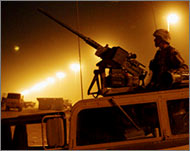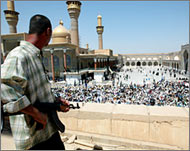US national security back to square one
In the two years since the 11 September 2001 attacks, the United States has fought two wars, both of which were billed by US President George Bush as key battles in the “war on terrorism”.

But while the military campaign in Afghanistan was viewed by some people as a necessary first step in the fight against al-Qaida, there remains fierce disagreement in Washington as to whether toppling Saddam Hussein and occupying Iraq has done anything to improve US national security.
Hawks accused Iraq of possessing weapons of mass destruction (WMD) and harbouring ties to groups like al-Qaida, posing an imminent threat to the American people.
Yet since US tanks rumbled into Baghdad on 9 April, no weapons have been found.
Western observers warn the US-led operation has transformed Iraq into a potential breeding ground for anti-Western activities and future recruitment.
The Bush administration framed the war in Iraq as part of a larger response to the September 11 attacks, but critics point out that no definitive connection between Saddam Hussein and Usama Bin Ladin was ever established.
“I’m not one of these people who said there is a link between al-Qaida and the Saddam regime before the war,” said Peter Singer, a national security fellow at the Brookings Institution, a Washington-based think tank.
Inevitable
However, even without a proven link to al-Qaida, there are those who firmly believe that Iraq had to be dealt with in the aftermath of September 11.
“We had to go after the regime in Baghdad, not necessarily because it was tied to 9/11…It was tied to 9/11 in terms of the lesson of 9/11: stop kicking the cans down the road and start dealing with your problems,” said Michael Eisenstadt, a senior fellow at the Washington Institute for Near East Policy, a conservative research centre.
 |
|
Some experts say invasion of |
Meanwhile, US reports claim that foreign fighters, including some from al-Qaida, are now streaming in from countries such as Iran, Syria and Saudi Arabia to conduct resistance attacks against US forces.
Far from providing a deterrent effect on “terrorism”, US actions could end up exacerbating the problem, said Singer.
“If Iraq continues to be unstable then you’ve got a long-term problem of Iraq being a battleground, but also a recruiting ground for terrorists,” he said.
The security vacuum and ongoing difficulties in restoring water and power distribution to pre-war levels in Iraq are playing right into the hands of the “terrorists”, said Judith Kipper, director of the Middle East Forum at the Council on Foreign Relations.
“I think that the mishandling of the post-war has made [Iraq] fertile ground for the bad guys to come in and take advantage of the opportunity,” Kipper said.
More attacks?
Could the occupation of Iraq actually increase threats against the United States?
The American people seem to think so. In a poll released on 9 September by the Program on International Policy Attitudes, 64% of the respondents said the US military presence in the Middle East had raised the possibility of another attack on American soil.
One week after US forces invaded Baghdad, an ABC News poll found that 58% of Americans believed the war would mitigate the so-called threat of “terrorism”, but in the most recent poll that number dropped by 18 points.
As for Iraq’s alleged WMD programme, nothing has been found to suggest Iraq possessed one.
|
“We had to go after the regime in Baghdad, not necessarily because it was tied to 9/11…It was tied to 9/11 in terms of the lesson of 9/11: stop kicking the cans down the road and start dealing with your problems.” Michael Eisenstadt, senior fellow, Washington Institute for Near East Policy |
The US may ultimately find evidence that Iraq had WMD and shipped them elsewhere before the war, the consequences of which could be devastating, said Singer.
“The situation then is that you created the very scenario that you worried about, which is the transfer of [WMD] to people who would use them,” he said.
Kipper said there’s little reason to believe US borders are less secure as a result of the war, but that the long-term impact of the occupation could be problematic.
“I think the homeland is about the same, but I think that in terms of the larger issue of US national security, we are more vulnerable,” she said.
Economic blow
Financially speaking, the occupation of Iraq is inflicting further damage on an already faltering US economy, something the Bush administration should be concerned about, she said.
“It’s costing the American taxpayer a huge amount of money in an already weak economy, and obviously a weak economy has an effect on national security,” she said.
Bush recently asked Congress for an additional $87 billion for operations in Iraq and Afghanistan, putting the total cost of the war and the occupation, through the end of next year, to over $150 billion.
Long-term projections for the reconstruction effort have been placed as high as $500 billion over several years.
With next year’s budget deficit expected to be roughly $480 billion, the United States could find itself without the resources to deal with future military threats, said Kipper.
Global position
 |
|
Militias taking control into their |
Perhaps most troubling, is the damage an open-ended occupation could inflict on US prestige around the world, said Joseph Wilson, a former US ambassador to Gabon.
Wilson also called attention to the Bush administration’s false pre-war claim that Iraq had sought to purchase uranium from Niger.
While the majority of the world appears to disagree with US actions in Iraq, Wilson said he’s more concerned about America’s already tenuous standing in the Middle East and the impact that any further straining of relations could have on the “war on terrorism”.
“For a generation or more, there has been a fair amount of resentment and envy and jealousy in the Arab world towards the United States, but at a minimum, a sense of grudging respect for what we represent,” Wilson said.
“I think that that rather amorphous jealousy, envy and concern about our policies in the Middle East may well have crystallized into a real loathing of the United States for what we’ve done in Iraq.”